Are you looking for foods that give you energy? We all know how tough life can be when we lack energy. In this Foot Palace guide, we’ll explore the top foods that can keep you energized throughout the day. Learn how these foods support your metabolism and provide the nutrients your body needs to stay active, alert, and thriving.
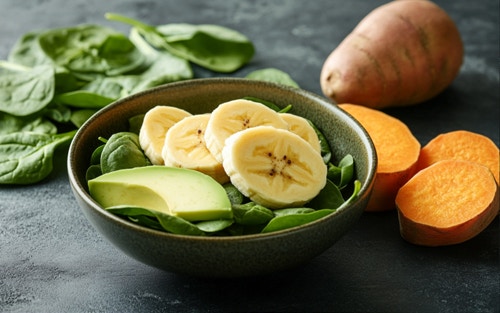
Key Takeaways
- Energy production relies on metabolism, which converts food into usable energy through macronutrients like carbohydrates, fats, and proteins.
- Incorporating nutrient-rich foods such as bananas, avocados, and sweet potatoes into your diet can sustain energy levels while avoiding refined carbs and high-sugar foods, which is crucial for preventing energy crashes.
- Healthy eating habits, including balanced meals, proper meal timing, and regular hydration, play a significant role in maintaining steady energy throughout the day.
Understanding Energy Production
To boost your energy levels, you need to grasp the basics of energy production within the body. Our energy comes from the food we eat, and the process by which our bodies convert this food into usable energy is known as metabolism. This involves a series of biochemical processes that break down macronutrients – carbohydrates, fats, and proteins – to provide energy or serve as building blocks for the body.
A well-structured diet significantly enhances daily energy levels. Nutrient-rich foods supply our bodies with the vitamins and minerals necessary for energy production and maintenance.
Here, we explore the role of metabolism and the significance of nutrient-rich foods in maintaining high energy levels.
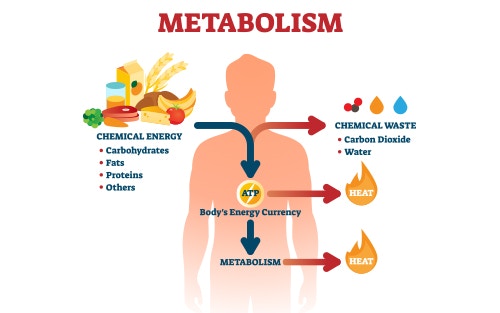
The role of metabolism in energy production
Metabolism is the engine that drives energy production. It includes all the biochemical processes that convert the food we eat into energy that fuels our daily activities. Carbohydrates are the body’s most readily available source of energy, and they, along with fats and proteins, are broken down during metabolism to provide energy or serve as building blocks for the body.
Specific foods can enhance energy production by supporting metabolic processes. For instance, oatmeal provides fiber and complex carbohydrates that enhance energy production, while avocados promote stable blood sugar levels, preventing energy spikes and dips. Including the best energy-boosting foods in your diet can further support these processes.
Sweet potatoes and leafy greens are also excellent choices for balancing energy levels due to their rich nutrient profiles. Vitamin C plays a crucial role in helping cells produce energy, making it another vital nutrient for maintaining energy.
Importance of nutrient-rich foods
Nutrient-rich foods, such as fruits, vegetables, and legumes, are the cornerstone of a balanced diet that supports sustained energy levels. These foods are packed with essential vitamins, minerals, and antioxidants that help maintain energy throughout the day. A balanced diet that includes a variety of these nutritious foods and healthy nutrients ensures that your body has what it needs for sustained activity.
Incorporating energy-boosting foods like kale, spinach, and hummus into your meals can significantly enhance your energy levels and give you energy. These foods are rich in essential nutrients for energy production and help maintain overall health. For sustained energy, it’s important to aim for a varied and balanced diet that suits your individual needs.
Best Foods for Sustained Energy
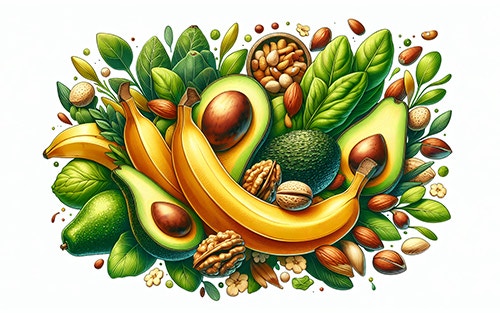
The foods we choose to eat play a pivotal role in maintaining energy levels throughout the day. Nutrient-dense foods are crucial for sustained energy as they provide the essential vitamins and minerals necessary for energy production. Foods high in complex carbohydrates, healthy fats, and proteins offer a stable release of energy, preventing the peaks and troughs that can lead to fatigue.
In the following sections, we will explore some of the best foods for sustained energy, including bananas, avocados, sweet potatoes, dark chocolate, and leafy greens. These foods are not only nutritious but also help in providing the energy needed to keep you going throughout the day.
Bananas
Bananas are a fantastic energy-boosting food due to their easily digestible nutrients. They provide a quick energy boost thanks to their natural sugars and fiber, which help sustain energy levels.
Bananas are as effective as sports drinks for fueling long workouts, making them an excellent pre-workout snack that can provide lasting energy to enhance performance.
Avocados
Avocados are rich in healthy fats, fiber, and protein, all of which contribute to maintaining stable blood sugar levels and providing long-lasting energy. Monounsaturated fats in avocados also provide sustained energy, making this fruit a valuable addition to your diet.
Sweet Potatoes
Sweet potatoes are rich in complex carbohydrates and offer long-lasting energy. They are packed with important nutrients like vitamin C, iron, and magnesium that contribute to sustained energy levels.
Adding sweet potatoes to your diet helps maintain energy throughout the day.
Dark Chocolate
Dark chocolate is rich in antioxidants, which help fight inflammation and improve blood flow, enhancing energy levels. It contains flavonoids that support cardiovascular health and provides a moderate amount of caffeine for a gentle energy boost without the jitters.
These attributes make dark chocolate an excellent option for sustained energy.
Leafy Greens
Leafy greens, such as kale, spinach, and collard greens, are packed with essential vitamins and minerals that support energy production. These nutrient-dense foods help maintain energy levels throughout the day and should be a staple in any diet aimed at boosting energy.
High-Energy Snacks
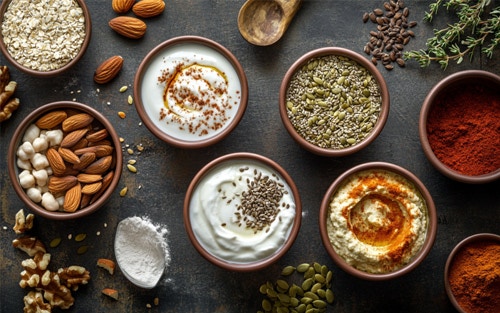
High-energy snacks are convenient options that provide a quick boost of energy whenever you need it. These snacks are perfect for on-the-go energy and can help you avoid the afternoon slump. They are often nutrient-dense and packed with healthy fats, proteins, and fiber, which contribute to sustained energy levels.
In the following sections, we will explore some of the best high-energy snacks, including nuts and seeds, Greek yogurt, and hummus. These snacks are not only delicious but also provide the nutrients necessary to keep you energized throughout the day.
Nuts and Seeds
Nuts and seeds are packed with nutrients such as omega-3 fatty acids, fiber, antioxidants, and magnesium, all of which contribute to increased energy levels. Some examples of nuts and seeds that can be consumed for an energy boost include almonds, cashews, chia seeds, walnuts, flax seeds, pistachios, pumpkin seeds, and peanuts. These snacks are particularly convenient for on-the-go energy as they are easy to carry and perfect for a quick trail mix.
Incorporating a variety of nuts and seeds into your diet can help you maintain steady energy levels throughout the day. They are not only delicious but also provide a mix of protein, healthy fats, and fiber, making them a perfect snack for sustained energy.
Greek Yogurt
Greek yogurt is rich in protein, healthy fats, and probiotics, making it a nutrient-dense option for sustained energy. It also provides simple carbohydrates that can offer quick energy. Greek yogurt is a convenient snack, perfect for eating on the go, and is ideal for a midday energy boost or before hitting the gym.
Hummus
Hummus is rich in protein, healthy fats, and fiber, making it an effective snack for managing hunger and sustaining energy. The protein and fiber content in hummus helps promote a feeling of fullness, leading to better hunger management and providing a steady release of energy.
Hummus is a versatile and popular snack option enjoyed worldwide.
Hydration and Energy
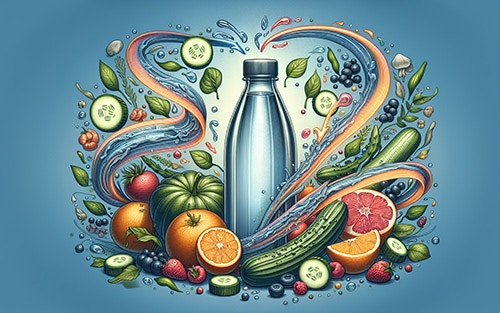
Proper hydration maintains energy levels and prevents fatigue. Water is essential for every cell to function properly, and dehydration can cause fatigue, highlighting the critical role of water in energy maintenance. Regular hydration keeps energy levels steady throughout the day.
In this section, we will explore the importance of water and water-rich foods in maintaining hydration and energy levels. These tips will help you stay energized and focused throughout the day.
Water
Water is essential for energy production and preventing fatigue. Dehydration can lead to partial dehydration, which can cause fatigue and impair physical performance. A practical way to maintain hydration is by carrying a water bottle and sipping throughout the day. Going all morning without water can lead to partial dehydration, so regular hydration is crucial for maintaining energy levels.
Proper hydration ensures your body functions optimally. Staying hydrated prevents fatigue and maintains steady energy levels.
Water-Rich Foods
Consuming water-rich foods like cucumbers and watermelon can significantly contribute to hydration and energy levels. These foods complement water intake and help maintain proper hydration, essential for keeping energy levels up throughout the day.
Incorporating water-rich fruits and vegetables into your diet is a simple yet effective way to stay hydrated and energized.
Foods to Avoid for Better Energy
Limiting certain foods that drain your energy helps maintain and improve your energy levels. Refined carbohydrates, high-sugar foods, and excessive caffeine can lead to energy spikes followed by crashes, causing feelings of fatigue. Skipping meals can also drain your energy, leaving you tired and sluggish.
Here, we discuss foods to avoid for better energy, including refined carbs, high-sugar foods, and excessive caffeine. By making mindful food choices, you can maintain sustained energy levels throughout the day.
Refined Carbs
Refined carbohydrates, such as processed white bread, pasta, and rice, can lead to quick energy spikes followed by crashes. These foods are commonly found in processed foods and can cause rapid changes in energy levels, making them undesirable for sustained energy. For stable energy levels, avoid refined carbohydrates and choose whole grains instead.
Incorporating complex carbohydrates like whole grains, legumes, and vegetables into your diet can help maintain steady energy levels and prevent the crashes associated with refined carbs.
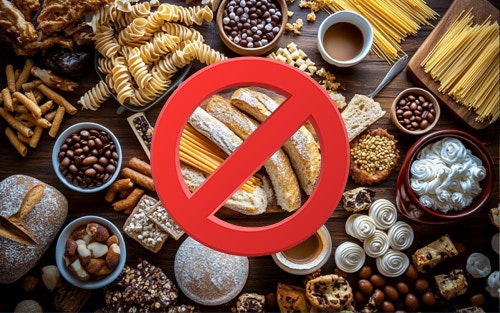
High Sugar Foods
High-sugar foods, such as candies, soft drinks, and pastries, are quickly digested and lead to a rapid spike in blood sugar levels. The immediate effect after consuming high-sugar foods is a surge of energy, which can feel exhilarating. However, this energy boost is often followed by a sharp crash, resulting in feelings of fatigue and decreased energy levels.
Limit high-sugar foods for better-sustained energy throughout the day to avoid rapid energy fluctuations.
Excessive Caffeine
Excessive caffeine consumption can lead to energy crashes after initial spikes, disrupt sleep patterns, and increase feelings of sleepiness. Although a cup of coffee or tea can temporarily boost energy, over-reliance on caffeine can negatively affect overall energy levels. Constant high coffee consumption may result in energy loss due to caffeine withdrawal.
Moderation is crucial when it comes to caffeine intake. Experts recommend avoiding caffeine at least 6 hours before bedtime to prevent it from affecting your sleep quality and subsequent energy levels the next day. Caffeine can remain in the body for up to 12 hours, so monitoring your intake is essential to maintain steady energy levels.
Eating Habits for Optimal Energy
Maintaining optimal energy levels isn’t just about what you eat but also how you eat. Healthy eating habits significantly contribute to sustained energy throughout the day. Foods that provide stable energy are those rich in whole grains, legumes, and healthy fats. Combining these with proper meal timing and avoiding skipping meals can help maintain energy levels and reduce fatigue.
Here, we explore the importance of balanced meals, meal timing, and why avoiding meal skipping is crucial for high energy levels.
Balanced Meals
Eating smaller, frequent meals instead of large portions maintains steady energy levels and reduces fatigue. Choosing minimally processed foods provides the necessary nutrients to avoid energy slumps. Incorporating a variety of in-season fruits and vegetables can enhance the nutritional value of meals, contributing to better energy production.
Foods rich in carbohydrates, proteins, and healthy fats are key to balanced meals that support sustained energy. Regular hydration is vital for energy levels, as water supports various bodily functions that contribute to energy production.
Meal Timing
Eating smaller meals more frequently can stabilize energy levels throughout the day. Consuming food every three to four hours helps prevent energy crashes and keeps your body fueled. Eating at consistent times supports energy management and aligns with the body’s natural rhythms.
Meal timing is crucial in managing energy levels throughout the day. For optimal energy levels, aim for smaller, frequent meals at consistent times.

Avoiding Skipping Meals
Regular eating patterns can prevent fatigue and maintain energy. Skipping meals can cause energy crashes and negatively impact productivity. Regularly eating balanced meals maintains steady energy levels and avoids fatigue.
Regular meal consumption is essential for preventing energy crashes and enhancing overall productivity. By ensuring you eat at regular intervals, you can maintain your energy levels and feel more energized throughout the day.
Energy Food Summary
In conclusion, maintaining high energy levels throughout the day is achievable with the right food choices and eating habits. By understanding the role of metabolism and the importance of nutrient-rich foods, you can make informed decisions about what to eat. Incorporating energy-boosting foods like bananas, avocados, sweet potatoes, dark chocolate, and leafy greens can help provide sustained energy. Additionally, high-energy snacks, proper hydration, and avoiding foods that cause energy crashes are vital strategies for staying energized. Remember, balanced meals and consistent meal timing are essential for optimal energy levels. Make these changes, and you’ll feel more energized and productive every day.
Energy Food Frequently Asked Questions
What are the best foods for sustained energy?
For sustained energy, reach for bananas, avocados, sweet potatoes, dark chocolate, and leafy greens. These nutrient-packed foods keep your energy levels steady all day long.
How does hydration affect energy levels?
Staying properly hydrated is key to keeping your energy up; you can feel pretty sluggish when you’re dehydrated. So, make sure to drink enough water and enjoy hydrating foods to keep those energy levels high!
Why should I avoid refined carbs and high-sugar foods?
Avoiding refined carbs and high-sugar foods is key to preventing energy spikes and crashes that leave you feeling drained. Instead, choose complex carbs like whole grains and veggies for more sustained energy.
How can meal timing help maintain energy levels?
Eating smaller, more frequent meals every three to four hours can really help keep your energy up and prevent those annoying crashes. Sticking to a consistent meal schedule also aligns with your body’s natural rhythms, which is a win for managing energy levels!
What are some high-energy snacks I can have on the go?
For a quick energy boost on the go, grab some nuts and seeds, Greek yogurt, or hummus. These are not only convenient but also pack a powerful mix of protein, healthy fats, and fiber to keep you fueled throughout your day.